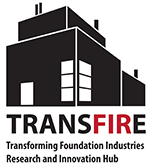Last month, I had the pleasure to join the Women Innovators in Foundation Industries (WINFI) workshop and networking event. Held in London at IOM3, the event brought together people from across the foundation industries to learn about Foundation Industry 4.0 solutions being led by women innovators. Digital solutions and Artificial Intelligence of course featured prominently, with innovations tackling topics including:
- The work of DigitLab, research to accelerate the adoption of digital technology, clean growth, and impacts on environment and society – Professor Saeema Ahmed-Kristensen
- Data-led solutions to cut costs and emissions in energy-intensive manufacturing, such as cement and steel manufacture – Buffy Price, Carbon Re
- Process control and automation, and benefits of digitisation – Lani Scholtz, Promteck Ltd. Also great to hear they are working on new ideas around inclusion
- Sensors and AI monitoring of concrete quality during transportation – Emeso Ojo, Cloud Cycle Ltd
- AI waste monitoring to identify materials in waste, to sort and recover materials – Alisa Pritchard, Greyparrot AI
- Materials passports, tracking the origin and composition of materials used in buildings and enabling future reuse – Angelo Mermiklis, Circuland
It was fascinating, and uplifting, to hear from women leaders of these innovative firms, and learn about their products that are enabling circularity, and reducing waste, emissions, and energy consumption.
I’ll be honest and confess that lunch is also always a favourite part of these events for me – not only for the excellent food, but also the excellent opportunities to meet and network with a diverse set of people, all involved in the innovation ecosystem in a variety of ways.
After the morning of speakers, the afternoon session got everybody involved for a workshop, designed and led by Professor Saeema Ahmed-Kristensen and team. We focussed on the opportunities brought by data, as it becomes increasingly available, used as a resource for new solutions. Following a data-driven design framework, adapted from a business model canvas, each table selected a sustainability-related challenge from their own experience and collaboratively (and surprisingly comprehensively, given the brief time window) explored possible digital solutions. My table picked a topic close to the heart of one us, whose work is in a family-run sustainable waste management business, rooted in their local community. We explored possibilities for AI sorting of waste, and intelligent distribution to downstream processing – keeping jobs local, and transportation to short distances, boosting the community while reducing emissions and promoting a circular economy.
All in all a great event that I hope will spark some new ideas and collaborations.
To learn more about the event, you can also visit KTN’s blog: https://iuk.ktn-uk.org/news/foundation-industries-4-0-workshop-networking-event-roundup/
Image credit: UKRI KTN
Written by Jo Stansfield

